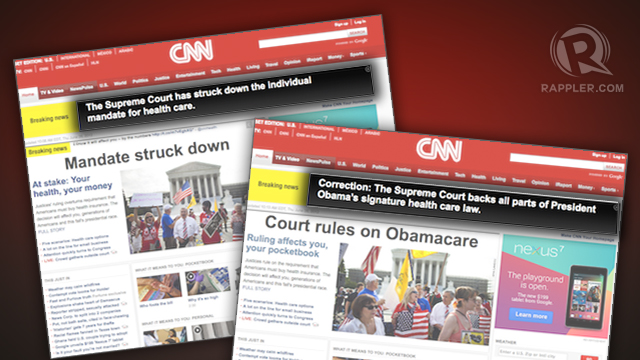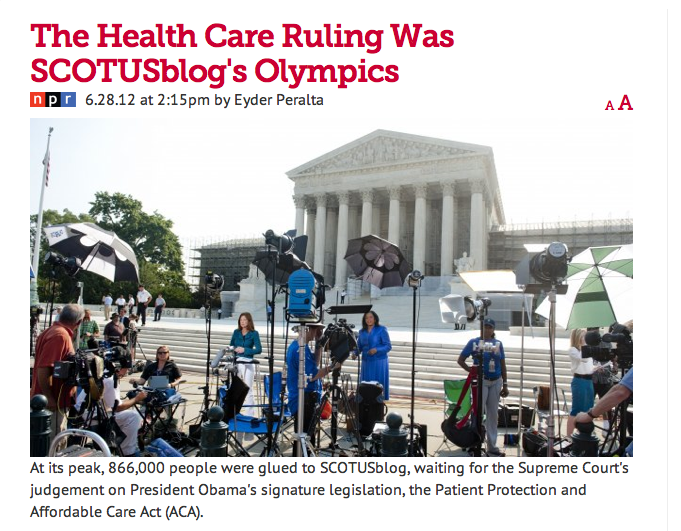SUMMARY
This is AI generated summarization, which may have errors. For context, always refer to the full article.

MANILA, Philippines – As a 23-year-old American, I have health care because the Affordable Care Act, popularly known as Obamacare, allows young adults to keep their parents’ insurance until the age of 26. So as CNN broke news to the world that Obamacare was struck down, it was hard not to let disappointment creep in. “Well, there goes my health care,” I thought. But in minutes, I got it back.

The problem didn’t have to do with whether or not government had overstepped its constitutional bounds, the problem was the news. Media had prioritized being first over being right.
Even President Obama initially saw the wrong ruling on TV. CNN’s John King called it a “dramatic blow to the president of the United States, a direct blow to his democratic party.” Thankfully, reports said, Obama stayed calm.
CNN and Fox corrected themselves but just as quickly as they pulled the pin out of the grenade, it blew up in their faces. Their mistake became the surprise story.
The truth is the error isn’t particularly shocking in today’s media landscape. The pressure for speed reporting will likely fuel similar blunders in other outlets and other countries, if something doesn’t change.
Today, history unfurls in live blogs and blow-by-blow tweets. Everyone has the power to be a publisher. Being first isn’t only a matter of news narcissism and bragging rights, though that’s undeniably part of it. Having the first words can mean your story is picked up, spreads, and drives traffic to your website. That traffic is later presented to marketers as a reason to drum up ad money.
But in the end gains are worth less than credibility lost. So why do media organizations fall into these traps?
Media mavens agree
Rappler asked the Philippines’ media mavens, the women in charge of the Philippines’ top TV stations, their opinions on the blunder. They were clear, breaking a story isn’t as important as telling it accurately.
Accuracy is very important to us in the GMA newsroom. Inaccuracy defeats the very purpose of journalism, I think. What is there to report and discuss about if you got the story all wrong? – Jessica Soho, GMA Network’s vice president for news
It’s in our nature as journalists to always get the scoop, the big get, and air the big story first. But the CNN fiasco showed us that it pays to take pains to understand or appreciate our story — its meaning and impact — before breaking it. – Ging Reyes, chief of ABS-CBN News and Current Affairs Division and managing director of ANC
It’s always better to be right though late, than first but wrong. – Luchi Cruz-Valdes, chief of TV5 News and Information Division
And yet these newswomen will wisely tell you that these mistakes happen in Philippine media too.
Cruz-Valdes pointed out via text that, “Only recently, Philippine media reported — or at least gave the impression — that it was a Chinese vessel that sank the boat of fishers in Bolinao. Turns out it’s more likely a [Hong Kong] vessel di ba?”
Over the past 12 months, multiple news groups have “killed” Umra Kato, a leader of the Bangsamoro Islamic Freedom Movement. And yet the misspelling of his name as “Umbra” lives on. Talk about resurrection.
A news reporter even intervened in the bungled Manila hostage crisis of 2010, talking to the kidnapper over the phone as police negotiators attempted to get through. That story, unfortunately, ended in the deaths of 8 Hong Kong tourists.
Soho said, “The process usually takes a bit more time but we’d rather be delayed in reporting about it (compared to competition maybe, or other media platforms like radio and even social media) than be incorrect. Similarly, we are very careful when reporting about the death of prominent personalities. Unfortunately, this is a lesson learned the hard way for us (Maureen Hultman case).”
Cruz-Valdes was forthright, “We have had our fair share of mishaps in TV5, although thankfully not on a major public policy or some headline story. Mostly on minor details of minor stories…but I’ve always maintained there is no such thing as fairly accurate. We have to be obsessively accurate.”
The heads of CNN and Fox News no doubt agree that accuracy must come first, and yet most news outlet have, at one time or another, witnessed a disconnect between their standards and their actions.
CNN took about 7 minutes to fully correct the news on air but deserves kudos for immediately issuing a statement owning up to its error.
CNN senior vice president and Washington bureau chief Sam Feist issued a memo to staff and promised an internal investigation.
As you all know by now, our initial reporting of the decision turned out to be wrong. Despite the best of intentions, we told our viewers and our online readers that the individual mandate in the Affordable Care Act had been struck down when, in fact, it had not.
Today we failed to adhere to our own standard, namely it’s better to be right than to be first. We take mistakes seriously, especially mistakes on such important stories. We are looking into exactly what happened and we will learn from it. – Sam Feist, CNN senior vice president
It took Fox two minutes to correct the error on air, but longer to give a statement. In a release obtained by Mediaite, Fox said:
We gave our viewers the news as it happened. When Justice Roberts said, and we read, that the mandate was not valid under the Commerce clause, we reported it. Bill Hemmer even added, be patient as we work through this. Then when we heard and read, that the mandate could be upheld under the government’s power to tax, we reported that as well—all within two minutes. – Michael Clemente, executive vice president of Fox News
Where does media go wrong
One source of the error could have been that the corespondents were reportedly relying on their producers for information. CNN’s Kate Bolduan said as much in her live report. “We’re still going through the reading, the opinion. But I want to bring you the breaking news that according to producer Bill Mears, the individual mandate is non-valid of, not a valid exercise of the commerce clause.”
Rappler CEO Maria Ressa, who reported for CNN for 18 years, believes it’s important to trust your producer but said ultimately, “It’s your face, it’s your name on the line.”
“I’ve said no (to producers)…I will not report it unless I’ve seen or verified it myself,” said Ressa.
She worried a wrong report could bring down the credibility of the organization.
Another factor working against the reporters was that they were gambling since the decision had been kept secret and was very complicated. Experienced journalists like Soho and Ressa agree that tapping sources to know and understand the news before it happens is one of the best ways to deliver informed news.
“Yes, ‘leaks’ are important especially in determining news production requirements,” Soho wrote via e-mail. “But until our reporter onsite or our news desk has gotten hold of the hard copy of the ruling itself (and it has to be from official sources) then it’s a no-go, for us,” she added.
Amy Howe, who has argued before the Supreme court, co-taught at Stanford Law School and is an editor at the breakout law blog SCOTUSblog, sent out a social media blast minutes before the decision, saying that no one knew the decision because there was internal pressure at the court not to reveal it and no one wanted to “ruin their careers.” She and other commentators on SCOTUSblog also advised viewers of their live blog to be patient since the decision would be long and complicated.



This is a positive example of group pressure. It speaks to Solomon Asch’s landmark psychology experiment on conformity. Asch puts several individuals in a room and tells them they are taking a test for visual acuity. He shows them 3 lines that are obviously of different lengths. Only one participant doesn’t know that all of the other subjects have been told to give the same wrong answer. So strong was the power of the group that 75% of individuals agreed with the wrong decision in at least one round.

Imagine being one of the correspondents lined up side by side in front of the Supreme Court. Next to you another reporter is delivering live news to her station. There is immense pressure to conform and deliver either a similar reading or at least some piece of information to your station as quickly as possible.
The lesson
The only remedy is to be an outlier. In his experiment, Asch found that when he gave even one other participant the right to his opinion, the independent participant almost always spoke up and gave the right answer. Even if the dissenting actor looked visually impaired, thanks to thick reading glasses, the real participant wouldn’t go along with the group.
Thankfully, during the Supreme Court reading several news agencies, like Bloomberg and AP, waited a few minutes to report the decision correctly at 10:07:31 and 10:07:55 respectively. Among the first to deliver the right opinion within the 10:07 time frame was SCOTUSblog, which the White House checked after seeing the initial wrong report.
Nearly 3,000 people retweeted the blog’s post that, “#SCOTUS upholds #ACA individual mandate.”
On one hand, new technology was to blame for compressing the news cycle, but on the other hand, it was part of the solution.
81-year-old blogger, Lyle Denniston admitted to The Washington Post he has “no patience with computers.” Yet he was SCOTUSblog’s star reporter. After covering the Supreme Court for nearly 6 decades, he was able to make sense of the decision and relay it to his editor over the phone.
In all likelihood, live media on traditional and non-traditional platforms will stumble again in the future.
“Unfortunately, yes we can expect similar mistakes now and in the future, especially with social media, which has become another source of news and information. This reality has therefore made us more conscious of our obligation to the public we serve — our news stories must be accurate, complete and fair at all times,” said ABS-CBN’s Reyes via text.
As the head of a new media company, Ressa said the media landscape is changing quickly, forcing journalists to adapt, but experience, judgment and process will help curb excesses as journalists struggle to establish new ground rules.
Certainly, new media is a double-edged sword but it gives more of us the power to be outliers. – Rappler.com
Add a comment
How does this make you feel?
There are no comments yet. Add your comment to start the conversation.